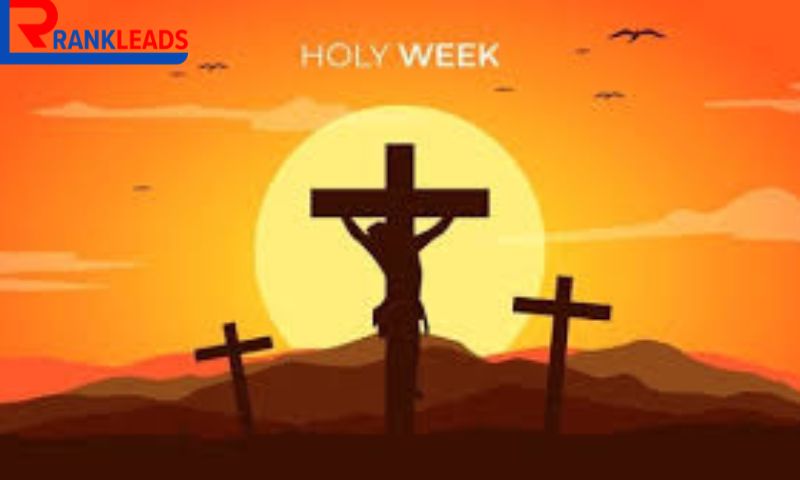Holy Week, the most significant period in the Christian liturgical calendar, is a time of deep reflection, solemn observance, and joyful celebration. Spanning from Palm Sunday to Easter Sunday, it commemorates the Passion, Death, and Resurrection of Jesus Christ. In 2024, Holy Week begins on Sunday, March 24, and concludes on Sunday, March 31.
This article provides an in-depth look at the traditions, significance, and ways to celebrate Holy Week, offering readers a comprehensive guide to this sacred time.
What Is Holy Week?
Holy Week is the final week of Lent and the lead-up to Easter, marking the culmination of Jesus Christ’s earthly ministry. It encompasses several pivotal events in the Christian faith, including His triumphant entry into Jerusalem, the Last Supper, His crucifixion, and resurrection.
Each day of Holy Week holds specific religious significance, accompanied by unique traditions and rituals observed by Christians worldwide.
Key Dates and Events of Holy Week 2024

1. Palm Sunday (March 24, 2024)
Palm Sunday commemorates Jesus’ triumphant entry into Jerusalem, where crowds welcomed Him with palm branches. This day symbolizes the start of Holy Week.
Traditions:
- Blessing and distribution of palm branches in churches.
- Processions reenacting Jesus’ journey.
- Readings from the Gospel narrating the event.
How to Celebrate:
- Attend Palm Sunday Mass or service.
- Display blessed palms at home as a reminder of Jesus’ sacrifice.
2. Holy Monday and Holy Tuesday (March 25-26, 2024)
These days focus on Jesus’ teachings and confrontations with religious leaders.
Holy Monday:
- Reflects on the anointing of Jesus at Bethany.
Holy Tuesday:
- Highlights Jesus’ predictions about His death and betrayal.
Traditions:
- Meditative prayers and scripture readings.
- Acts of charity and penance.
3. Spy Wednesday (March 27, 2024)
Spy Wednesday recalls Judas Iscariot’s betrayal of Jesus.
Traditions:
- Reflection on themes of loyalty and betrayal.
- Evening prayer services in some traditions.
The Sacred Triduum: The Heart of Holy Week
The Sacred Triduum, spanning Holy Thursday, Good Friday, and Holy Saturday, is the most solemn part of Holy Week.
4. Holy Thursday (March 28, 2024)
Holy Thursday commemorates the Last Supper, where Jesus instituted the Eucharist and washed His disciples’ feet.
Traditions:
- Evening Mass of the Lord’s Supper.
- The washing of feet ceremony.
- Procession of the Blessed Sacrament.
- Adoration of the Eucharist.
How to Celebrate:
- Participate in the evening liturgy.
- Reflect on the importance of humility and service.
- Spend time in Eucharistic adoration.
5. Good Friday (March 29, 2024)
Good Friday commemorates the crucifixion and death of Jesus Christ. It is a day of mourning and solemnity.
Traditions:
- Stations of the Cross processions.
- Veneration of the Cross.
- Reading of the Passion narrative.
- Fasting and abstinence.
How to Observe:
- Attend Good Friday services or processions.
- Engage in personal prayer and meditation.
- Practice acts of penance and charity.
6. Holy Saturday (March 30, 2024)
Holy Saturday is a day of quiet reflection, marking the time Jesus’ body lay in the tomb.
Traditions:
- Preparation for the Easter Vigil.
- Lighting of the Paschal Candle.
- Blessing of water and renewal of baptismal promises.
How to Celebrate:
- Participate in the Easter Vigil Mass.
- Spend time in prayer, reflecting on Christ’s sacrifice.
Easter Sunday: The Joyful Conclusion (March 31, 2024)

Easter Sunday celebrates the Resurrection of Jesus, the cornerstone of Christian faith.
Traditions:
- Festive church services with joyful hymns.
- Decorating and sharing Easter eggs as symbols of new life.
- Family gatherings and feasts.
How to Celebrate:
- Attend Easter Sunday Mass.
- Share a festive meal with loved ones.
- Reflect on the hope and renewal symbolized by the Resurrection.
Why Is Holy Week Important?
Holy Week holds profound spiritual significance for Christians. It is a time to:
- Reflect on Jesus’ sacrifice and love.
- Deepen one’s faith and commitment.
- Embrace themes of forgiveness, humility, and service.
How Holy Week Is Celebrated Around the World
Holy Week traditions vary widely across cultures and regions, each adding unique flavors to the observance.
1. Spain
- Elaborate processions with statues of Christ and the Virgin Mary.
- Participants often wear traditional penitential robes.
2. Philippines
- Passion plays reenacting Christ’s suffering.
- Devotees participate in acts of penance, such as flagellation.
3. Italy
- Solemn Good Friday processions.
- Easter Vigil Masses featuring dramatic lighting ceremonies.
4. Latin America
- Vibrant street processions with music and dance.
- Traditional foods shared during family gatherings.
Preparing for Holy Week 2024
To make the most of Holy Week, consider the following steps:
1. Spiritual Preparation
- Attend confession to cleanse your soul.
- Dedicate time for prayer and meditation.
2. Family Participation
- Share the story of Holy Week with children.
- Engage in family prayers and activities.
3. Community Involvement
- Join church services and local processions.
- Volunteer for charitable activities.
Holy Week and Modern-Day Reflections
In today’s fast-paced world, Holy Week serves as a reminder to pause and reflect on the deeper aspects of life. It offers an opportunity to:
- Rekindle spiritual connections.
- Find solace and hope in faith.
- Strengthen bonds with family and community.
Conclusion
Holy Week 2024 invites Christians to journey through the final days of Jesus’ earthly life, culminating in the joyous celebration of His Resurrection. By participating in the traditions, attending services, and embracing the spirit of the season, believers can experience a profound renewal of faith.
Whether observed through solemn prayer, vibrant processions, or quiet reflection, Holy Week is a powerful reminder of Christ’s love and the hope of eternal life. As you prepare for this sacred time, may it bring peace, inspiration, and spiritual growth.








